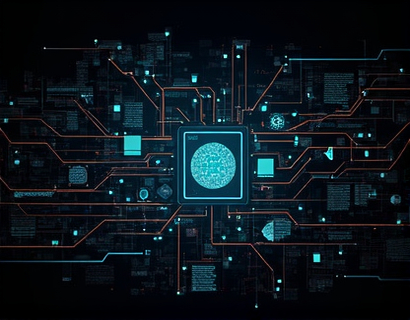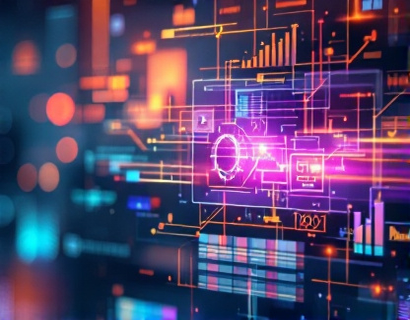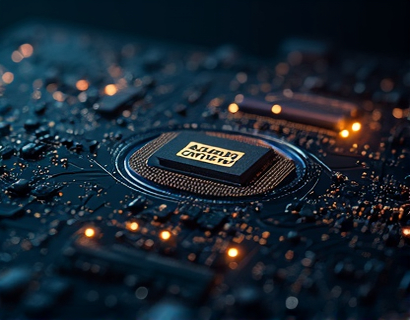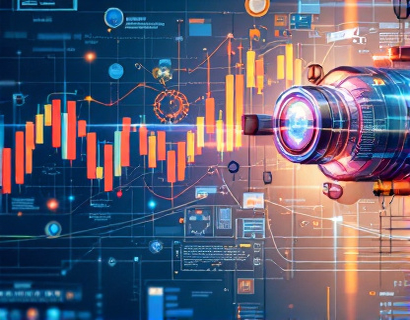Crypto and AI Synergy: Revolutionizing Digital Solutions for the Next Generation
The intersection of cryptocurrency and artificial intelligence (AI) is giving birth to a new era of digital solutions, one that promises to redefine how we interact with technology and manage our digital lives. This synergy is not just a convergence of two powerful technologies but a revolutionary approach that enhances user experiences, secures transactions, and opens up unprecedented opportunities for innovation. As we explore this transformative landscape, it's essential to understand how the integration of crypto and AI is reshaping the digital world and what this means for the future.
Understanding the Basics: Cryptocurrency and AI
To fully appreciate the synergy between cryptocurrency and AI, it's crucial to first understand the fundamentals of each technology. Cryptocurrency, often referred to as digital or virtual currency, operates on a decentralized network known as a blockchain. This technology ensures transparency, security, and immutability in transactions without the need for intermediaries like banks. Bitcoin, launched in 2009, was the first and most well-known cryptocurrency, but thousands of others have since emerged, each with unique features and use cases.
Artificial intelligence, on the other hand, involves the simulation of human intelligence processes by machines, particularly computer systems. These processes include learning (the acquisition of information and rules for using it), reasoning (using rules to reach approximate or definite conclusions), and self-correction. AI technologies such as machine learning, natural language processing, and computer vision are rapidly advancing, finding applications in various sectors from healthcare to finance.
The Emergence of Crypto and AI Synergy
The convergence of cryptocurrency and AI is a relatively recent development, driven by the need for more secure, efficient, and intelligent digital solutions. One of the primary areas where this synergy is making a significant impact is in the enhancement of blockchain technology itself. AI can optimize blockchain operations, improve scalability, and enhance security, addressing some of the key challenges faced by current blockchain systems.
For instance, AI algorithms can be used to predict and prevent fraudulent activities on the blockchain by analyzing patterns and detecting anomalies in real-time. This not only strengthens the security of transactions but also builds greater trust among users. Moreover, AI can optimize the consensus mechanisms used in blockchain networks, making them more energy-efficient and faster, which is crucial for widespread adoption.
Enhancing User Experiences through AI-Driven Crypto Applications
One of the most exciting aspects of the crypto and AI synergy is the creation of advanced applications that significantly enhance user experiences. These applications leverage AI to provide personalized, intuitive, and seamless interactions, making complex crypto concepts more accessible to the general public. For example, AI-powered crypto wallets can automatically manage assets, provide real-time market insights, and suggest optimal trading strategies based on user preferences and market conditions.
Another area where AI is making a difference is in decentralized finance (DeFi). AI-driven DeFi platforms can offer more sophisticated lending, borrowing, and trading services by analyzing vast amounts of financial data to make informed decisions. These platforms can also reduce the risk of human error and increase the efficiency of financial operations, making DeFi more user-friendly and accessible.
Security and Fraud Prevention
Security is a paramount concern in the crypto space, and AI plays a crucial role in addressing this issue. Traditional security measures often fall short against sophisticated cyber threats, but AI can provide a more robust defense. By continuously learning from new data, AI systems can adapt to emerging threats and improve their detection capabilities over time. This dynamic approach is particularly valuable in identifying and mitigating risks associated with smart contracts, phishing attacks, and other cyber threats.
Furthermore, AI can enhance the privacy of crypto transactions through advanced encryption techniques and zero-knowledge proofs. These methods allow for verification of transaction validity without revealing sensitive information, ensuring that user data remains confidential and secure. This is especially important as the adoption of crypto continues to grow, and the need for robust privacy solutions becomes more critical.
Optimizing Blockchain Performance with AI
Blockchain technology, while revolutionary, faces challenges related to scalability and transaction speed. AI can help overcome these limitations by optimizing various aspects of blockchain operations. For example, AI algorithms can be used to predict network congestion and dynamically adjust resource allocation to maintain optimal performance. This proactive approach ensures that the blockchain remains efficient and responsive, even as the number of transactions increases.
Another significant area of improvement is in the development of more efficient consensus mechanisms. AI can analyze different consensus algorithms and suggest optimizations based on real-time data and performance metrics. This not only enhances the speed and reliability of blockchain networks but also reduces energy consumption, addressing environmental concerns associated with traditional proof-of-work systems.
Innovative Use Cases: Beyond Finance
While the finance sector is a major beneficiary of the crypto and AI synergy, the potential applications extend far beyond traditional banking and trading. In the realm of supply chain management, AI-driven blockchain solutions can provide end-to-end transparency and traceability, ensuring that products are authentic and ethically sourced. This is particularly valuable in industries like pharmaceuticals, luxury goods, and food safety, where traceability is crucial.
In the healthcare sector, the combination of crypto and AI can revolutionize data management and patient care. Blockchain can secure and decentralize patient records, while AI can analyze this data to provide personalized treatment recommendations and predict health outcomes. This integration not only enhances data security but also improves the quality and efficiency of healthcare services.
Another innovative use case is in the domain of digital identity verification. AI-powered blockchain solutions can create secure and verifiable digital identities, reducing the risk of identity theft and fraud. This is especially beneficial in regions with limited access to traditional identity documents, providing a reliable and accessible way to establish digital identities.
Challenges and Considerations
Despite the numerous benefits, the integration of crypto and AI is not without its challenges. One of the primary concerns is the regulatory landscape. As both crypto and AI are still evolving fields, regulatory frameworks are often lagging behind, creating uncertainty for developers and users alike. It's essential for stakeholders to engage with policymakers to create clear and supportive regulations that foster innovation while ensuring safety and compliance.
Another challenge is the technical complexity involved in combining these technologies. Developing AI-driven crypto applications requires a deep understanding of both fields, which can be a barrier for many developers. To overcome this, there is a growing need for interdisciplinary collaboration and education, fostering a community of experts who can bridge the gap between crypto and AI.
The Future of Crypto and AI Synergy
Looking ahead, the synergy between cryptocurrency and AI is poised to drive significant advancements in digital solutions. As technology continues to evolve, we can expect to see even more sophisticated applications that push the boundaries of what's possible. The integration of AI with other emerging technologies, such as quantum computing and the Internet of Things (IoT), will further enhance the capabilities of crypto-based systems, opening up new frontiers in digital innovation.
Moreover, the growing awareness and acceptance of crypto and AI among the general public will drive greater adoption and investment in these technologies. As more businesses and individuals recognize the potential of crypto and AI, we can anticipate a surge in the development of cutting-edge applications that transform various industries and aspects of daily life.
In conclusion, the synergy between cryptocurrency and AI represents a powerful force for innovation, with the potential to revolutionize digital solutions for the next generation. By leveraging the strengths of both technologies, we can create more secure, efficient, and intelligent systems that enhance user experiences and drive progress across multiple sectors. As we continue to explore this exciting frontier, the possibilities are truly limitless.










































